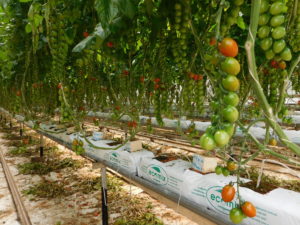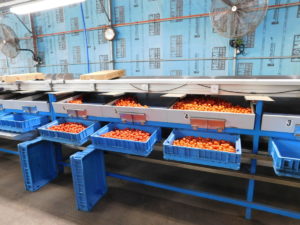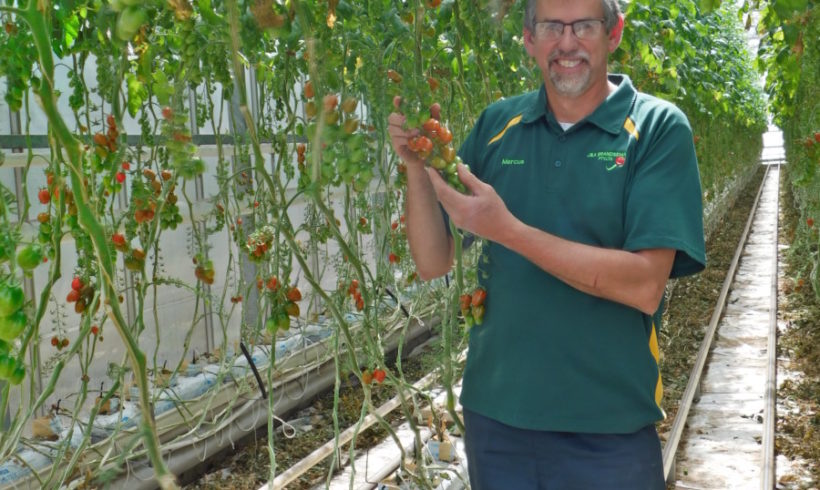The Brandsema family have a long history of involvement in agriculture in Tasmania – Marcus and Anthony’s grandfather started a market garden in Launceston 60 years ago; the farm moved to Turners Beach, right next to the north coast, and when the brothers took over the farm in 2007 they began transitioning the site into a hydroponic hothouse, suitable for growing tomatoes and other sub-tropical crops. The Brandsema speciality is cherry tomatoes, which Marcus believes are generally a better tasting tomato, and he has observed a significant shift in the market in the last decade towards snack-size tomatoes and away from larger tomatoes. You’ll sometimes find some of Brandsema’s Perino and Solanato tomatoes in Coles and Woolworths respectively (although you’ll need to look for the right shaped punnet as they aren’t able to have grower information included on the punnets of the licensed tomato variety), but they also grow two other varieties for the local market, which are regularly included in BB boxes.
 Brandsema tomatoes are grown using a fairly standard hydroponic set-up – the plants grow in a rockwool plug and are directly supplied with nutrients in a water solution. The plants grow vertically in rows, and in between the rows are rails which serve a dual purpose – a range of farm machinery can use them to travel on, but they are also filled with water heated by the onsite boiler, powered by burning waste from local sawmills; this keeps the hothouse at a temperature suitable for growing tomatoes all year round. Marcus experimented with introducing predatory insects to combat the primary pest in hothouses – the white-fly – but when this resulted in plant damage after the insects ran out of white-flies to eat, he made the shift to using a certified organic non-toxic soap-based spray, which kills the fly by covering the surfaces of the body that it uses to breath, suffocating it.
Brandsema tomatoes are grown using a fairly standard hydroponic set-up – the plants grow in a rockwool plug and are directly supplied with nutrients in a water solution. The plants grow vertically in rows, and in between the rows are rails which serve a dual purpose – a range of farm machinery can use them to travel on, but they are also filled with water heated by the onsite boiler, powered by burning waste from local sawmills; this keeps the hothouse at a temperature suitable for growing tomatoes all year round. Marcus experimented with introducing predatory insects to combat the primary pest in hothouses – the white-fly – but when this resulted in plant damage after the insects ran out of white-flies to eat, he made the shift to using a certified organic non-toxic soap-based spray, which kills the fly by covering the surfaces of the body that it uses to breath, suffocating it.
 Last season the family reduced the volume of tomatoes they were growing under contract for Coles, freeing up space in their 1 hectare hot-house for a range of trial crops including cucumber, capsicums and eggplant. Good research and planning resulted in high quality product which sold well in the local market, but half-way through the season disaster hit – the incursion of fruit-fly into the state meant initially that produce had to simply be discarded, and whilst this was soon moved to a policy of allowing sale into markets (like Victoria) that already home the insidious pest species, or the sale of produce fumigated in accordance with bio-security protocols, this unfortunately still resulted in the termination, for now, of their eggplant production. Despite significant losses, the Brandsemas are positive about a future hopefully once again free of the bureaucratic and logistical hurdles of fruit-fly, and continue to be responsive to the local market, with a new trial crop this year of chillies!
Last season the family reduced the volume of tomatoes they were growing under contract for Coles, freeing up space in their 1 hectare hot-house for a range of trial crops including cucumber, capsicums and eggplant. Good research and planning resulted in high quality product which sold well in the local market, but half-way through the season disaster hit – the incursion of fruit-fly into the state meant initially that produce had to simply be discarded, and whilst this was soon moved to a policy of allowing sale into markets (like Victoria) that already home the insidious pest species, or the sale of produce fumigated in accordance with bio-security protocols, this unfortunately still resulted in the termination, for now, of their eggplant production. Despite significant losses, the Brandsemas are positive about a future hopefully once again free of the bureaucratic and logistical hurdles of fruit-fly, and continue to be responsive to the local market, with a new trial crop this year of chillies!

